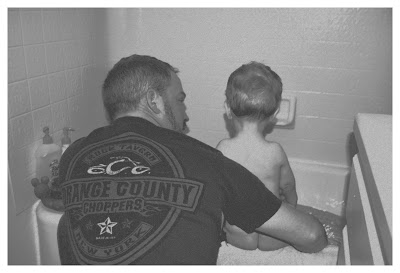PERSPECTIVE - Parenting a child with different abilities
Perspective - Parenting a child with different abilities
(orig. published 11.16.11)
Perspective: noun – the capacity to view things in their true relations or relative importance
Tonight I was privy to a humbling experience, an important reminder on keeping things in perspective. Colson’s greatest upset this evening was his inability to clap his hands. Scratch that, he can clap his hands. Colson was upset because when he claps his hands, he is unable to make any noise (muscle deficiency related to his AMC). Meanwhile, right next to him, his sister Cayleigh’s greatest upset was the fact there are no pink M&M’s in her M&M package (really Mars Chocolate, why AREN’T there any pink M&M’s anyways?)
Their disdain for the moment was equal. Their problems, completely incomparable. Both of them required a one on one conversation with a whole hearted and meaningful explanation regarding their troubles from their wise Mother’s point of view. “Cayleigh, Princess, I know you adore pink and purple, (“pink, purple favorite color!”), however, sometimes; things you enjoy may not always be available in the colors you enjoy (why yes, she does in fact have pink babies, pink ponies, pink blocks, and pink books which makes my lesson difficult to prove). How about we write a letter to Mars and offer up your suggestion? You will not change anything by sitting on the sidelines and merely thinking about it my darling child.” She nodded and popped more M&M’s in her mouth followed with a chocolaty request to color. I’m not entirely sure Mars Chocolate would be able to interpret her scribbles as a suggestion for Pink M&M’s so this weekend I will help her write her letter. Signed, I anticipate, with pink scribbles and perhaps a pink Hello Kitty sticker or three.
Colson’s problem required more thought. Parenting in itself is a constant learning experience. A daily reinvention of your thought process, of the way you parent. Parenting a child with disabilities different abilities is an entirely separate challenge in itself. Parenting a differently abled child requires you to be more creative, more sensitive, and more educated for there are not many people around you who share these different challenges with you. You are your child’s biggest advocate. You know what it’s like to research any alternatives to surgery late into the night. You know what it’s like to maintain therapy schedules, to hire and subsequently fire doctors, therapists and aides and to travel across the country for only the best doctors you can find. You know how much it hurts when people treat your child differently. It can be a lonely world at times; it’s a different sacrifice than most parents’ experience. A parent of a child with different abilities must re-adapt their thinking, much the way my child must adapt his daily life. We must constantly re-assure our children they are just like everyone else; they just do things a little differently. Bringing the topic of this writing into the equation, perspective would suggest everyone else is just like my son; THEY just do things a little differently.
Maintaining my child’s self esteem is a substantial daily goal for me for each of my children, but it’s a challenge in different ways given their abilities. “Why are you not able to clap your hands AND make noise like Dora the Explorer and your sister, Colson? Well honey, you have a little bit different arms than they do”. We are in the “why” stage, so not surprisingly, the next question is “why are my arms different”? Not that even I had accepted my original explanation as being thorough in the first place, I prefer the stall technique until I can develop an explanation which is acceptable to my son. “You have a condition called Arthrogryposis, remember Colson? This makes your arms and legs a little different than most people, and this is the reason you get to drive your awesome wheelchair all the other kids ask their parents for.” True statement. Colson is often the subject of envious children on the playground who all want to drive his “car”. One little boy even asked his parents for a wheelchair for Christmas! His parents weren't so kind though, much to his disappointment. It’s interesting to see that depending on each child’s perspective, either driving the “car” or being able to make noise when clapping is the more desirable fun activity to do.
Often, I find parents choose the easy route and simply give their children answers instead of encouraging them to solve their problems. I stand firm in my belief that nothing will change unless you yourself act. I encourage my children daily to create their own solutions, offering up only partial answers to stimulate their thought process. Tonight, I encouraged Colson to continue clapping, even if he didn't make any noise. I suggested he think of alternative ways to make noise and he began to kick his chair and clap at the same time. There is no greater responsibility as a parent than to enable and guide your children to become independent. It is the responsibility of the parent of children of all abilities to empower them. To allow them to become as independent in life as they possibly can be. I will not clap for my son; instead, I will teach him creativity. I will not enable others to crush his spirit with offending remarks; I will teach him how to respond.
It’s healthy to every so often question the basic things we have always taken for granted. What would Cayleigh do if she could not clap? Would she be so troubled by the lack of pink M&M’s? What would you do if you could not clap?
Be thankful for your every ability, no matter how different or the same they are. For there is no one better to be, than yourself.
Much love.
-J-




Comments
Post a Comment